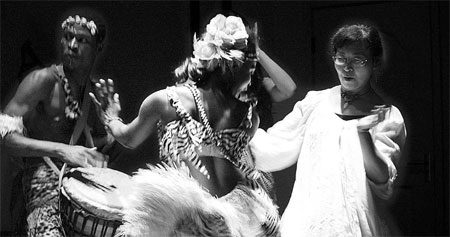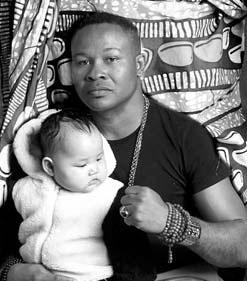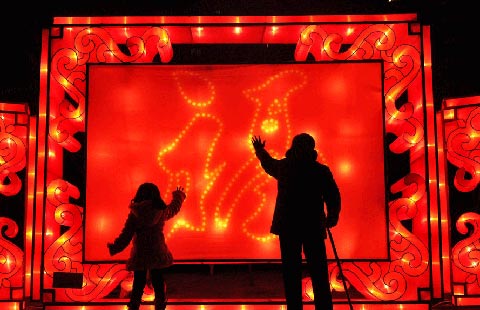Cross-cultural interactions
Updated: 2014-02-16 08:36
By Mike Peters (China Daily)
|
|||||||||||
Multimedia artist Ajike Njoku uses art to preach peace and tolerance and to promote social harmony, Mike Peters reports.
Ajike Njoku is never shy and always direct, whether communicating with his rich, merry voice or his camera or even his drums. "A world gone crazy gave its gun to a 12-year-old," writes the Beijing-based multimedia artist in the introduction of his book, AK-47 in a Wild Why World. Despite a litany of frustration with the culture of victimhood on his home continent, the 37-year-old Nigerian's book is not a long whine but a rallying cry.
Though modern African society faces "myriads of problems", he says, it doesn't need to depend on external forces to solve them. His biting commentary in the book is laced with irony and other humor, including cartoons that are sometimes as edgy as Aaron McGruder's The Boondocks in the US.
Njoku's fine-art ink-wash drawings, meanwhile, have almost unnecessary titles with messages: In Abandoned Responsibility, for instance, a swarm of toddlers climb on their African mom as one of the youngsters stares down his unkempt father in the foreground.
In the past six years, Njoku has shifted his focus from the way Africans see themselves to the way Chinese and Africans see each other. As he continues to write narratives, humor and poetry, he and his camera are all over China, capturing images of Africans who have built new lives here.
While too many Africans see themselves as victims, he says, many Chinese have seen Africans as "people just out to make a buck any which way they could".
Few people, he says, realized what the African community was giving back to Beijing and the other Chinese cities where they have studied and made their lives and homes.
To change perceptions, says the man who goes by the moniker "Saint Jerry", he began publishing LensAfrika, a magazine focused on telling the African story in the world's second-largest economy, in 2009.
China-Africa business news dominates the pages. It's not all rah-rah, though, as Njoku's directness often shines through, as in the recent headline "One Bad Apple on the China-Africa Menu". The magazine also includes features that celebrate human and cultural interactions.
"China thinks it knows Africa, but it does not know Africa," he says solemnly. "Africa thinks it knows China, but it does not know China."
Njoku believes strongly that art offers China and Africa ways to see the other from different perspectives, to find common ground, and to discover and relish differences. He defines himself as a new-media artist, photographer, writer, drummer, Web designer and author.
He came to China in 2008, with a borrowed camera to document the growing presence of Africans in Chinese cities. His images have been featured in a group exhibition, two solo shows, and in 2012 at the renowned Pingyao Photo Festival, where he is believed to be the first African photographer to exhibit there.
"Anything I lay my hands on becomes creative - even you!" he writes in the catalog for Across the Lines, a show of photos and paintings he put on last year with his friend Theo Akonga, a Congolese artist in Beijing.
"I want to use my art to preach peace and tolerance and to promote social harmony, especially between China and Africa," Njoku says.
That message rings loud and clear in his works, including a striking self-portrait with a Chinese child on his lap - a spontaneous moment in which he sees the Chinese boy examining "the potential of Africa" in Njoku's big hand. There are such cross-cultural interactions in many of his photos and paintings, including the colorful Africa Day at Yugong Yishan and Aids and Grips; in the latter, two Chinese women and one African woman help a pregnant African woman at a critical moment of labor.

"When you bring cultures together, there's always misconceptions before everyone begins to appreciate each other's values and cultural attributes," says Sam Ahadu, an immigrant turned Beijing music promoter who applauds his friend's multimedia efforts. Many of Njoku's photographs, like the one above (pictured), show Chinese people experiencing the wild and wonderful ways of traditional African dance and music. In 2010, he published Wonderful World, Beautiful People with the Shandong Friendship Publishing House in Jinan.
He is a man of strong faith, too, and never ends an e-mail or a hug without a blessing wish for the recipient.
Among the most luminous images at his recent Beijing show: The Way of the Cross, a 2004 watercolor and ink drawing with soft-featured Africans milling around the foreground of the crucifixion site.
"May God continue prosperity for you all and grant you divine favors in everything you lay your hands to do," he told well-wishers at the gallery opening.
Contact the writer at michaelpeters@chinadaily.com.cn
Joseph Catanzaro and Chen Yingqun contributed to this story.
|
One of Ajike Njoku's favorite images is this self-portrait, in which he sees a Chinese child examining "the potential of Africa" in his big hand. Photos Provided to China Daily |

(China Daily 02/16/2014 page5)
Today's Top News
No much progress in Syria peace talks
Lantern Festival fires kill 6 in China
China urges US to respect history
KMT leader to visit mainland
11 terrorists dead in Xinjiang
Illegal detention reports probed
4 die in Austrian train-car crash
China spends billions on rural education
Hot Topics
Lunar probe , China growth forecasts, Emission rules get tougher, China seen through 'colored lens', International board,
Editor's Picks

|

|

|

|

|

|






